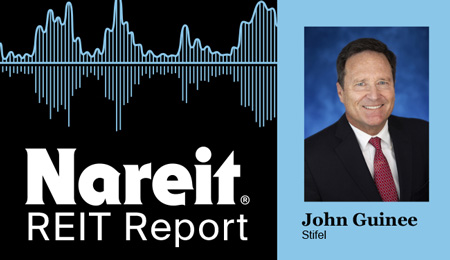 John Guinee, managing director at Stifel, joined Nareit’s REIT Report podcast during REITworld 2019 in Los Angeles.
John Guinee, managing director at Stifel, joined Nareit’s REIT Report podcast during REITworld 2019 in Los Angeles.
Guinee noted that the overall REIT market has drifted from a “net asset value (NAV)-based investment bias to a real bias of cash flow growth, dividend growth, and value creation.” Across all property sectors there’s demand from investors for stocks that incorporate these three components, he said.
Turning to the industrial sector, Guinee pointed to in-place rents that are 10%-20% below market value, while land costs are going up, and supply/demand is broadly in balance. At the same time, e-commerce is providing about 60 million square feet of additional demand. “With that backdrop, the industrial REITs are able to generate high FFO growth simply because they have such good fundamentals,” Guinee said.
Multifamily is much the same, according to Guinee, with supply/demand largely in balance and topline revenue growth of 4%-5%. Office REITs, however, are finding it “very difficult” to grow FFO and the dividend.
Guinee noted that for the past two years, stocks with solid underlying fundamentals “have all gotten fairly fully-valued.” Investors are now looking at “value names to determine which ones are going to change their stripes and be re-rated to the positive, and which ones have underlying fundamentals which remain challenged and instead of being value opportunities are really value traps.”
Looking at REIT balance sheets, Guinee said that of the 32 REITs he covers, only two have challenging balance sheets and the others are “good, almost too good.” He said REIT boards and management teams should continue to “over-equitize and keep their balance sheets in extraordinarily good shape.” Probably 90%-95% of all REIT balance sheets are in excellent shape, he added.
As for REIT generalist investors, Guinee noted that their participation rises in risk-off, declining interest rate environments. If they do stay engaged in the market in 2020, he said, they are likely to favor large cap liquid names with good fundamentals.